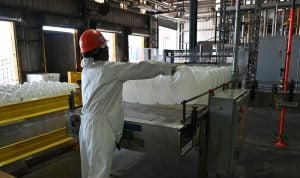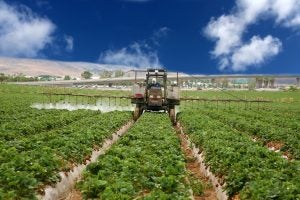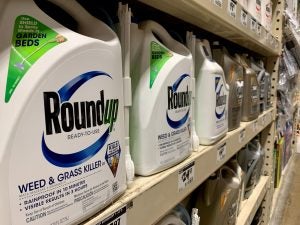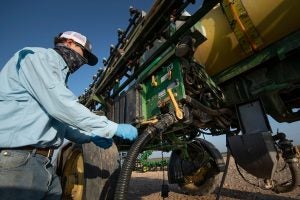Pesticides is a term for a broad range of products that control pests and diseases, which include those under more specific categories such as herbicides (to kill weeds), insecticides (to kill insects), fungicides (to kill fungi), and so on. Responsible pesticide usage in both convention and organic production helps to protect our food supply while ensuring the safety of farmers, workers, land, and our community.
Without pesticides we would lose more crops overall and have more damaged crops, which would contribute to less food, higher costs of production, and lower efficiency.
The U.S. Environmental Protection Agency (EPA) helps protect workers through rigorous scientific testing of pesticides for human health and environmental safety. They also set labels with directions for proper use, storage, and disposal of pesticides, which further protect workers, the public, and the environment. Other risk mitigation measurements may include reduced application rates, extending the time before people can access the area where a pesticide has been applied (restricted entry interval), closed systems for mixing and loading pesticides to reduce exposure, and personal protective equipment (PPE), such as gloves, safety glasses, and respirators, based on what is needed.

With all of these factors to consider, how does one ever keep track of all of this, let alone make sure they’re applied correctly? Another keystone of effective and safe pesticide use in agriculture is having trained and qualified people applying the products. Pesticide applicator certification programs meet this need.
Who must get a pesticide applicator license?
People who use or supervise the application of restricted use pesticides (RUPs) are required by federal law to be certified in accordance with EPA, state, territorial, and tribal regulations.
The EPA classifies pesticides into two main groups: restricted use pesticides (RUPs) and general use (unclassified) pesticides. The difference between the two is that RUPs cannot be bought or used by the general public, because without added restrictions and training they pose a significant risk to human health and/or the environment. It’s similar to prescription medications, which require medical supervision versus over the counter medications that anyone can access. Directions for use, dosages, who can use them, and for what purpose may require more knowledge and restrictions, so that the maximum benefits can be reached.
It’s important to note that, just like with medications, even if something is classified as general use, it can be misused and caused harm.
Why is pesticide applicator certification important?
These certification programs make sure that people are trained and knowledgeable in the application of pesticides, so that we can minimize risks to human health and the environment.
Farmers live on or near the land they farm, so they’re directly affected by the safety of the products that they use. Any added product, like a pesticide, is also an added expense. So it’s important to avoid using too much or even too little of the product. Over application wastes money and can increase risks as described above. However, too little can contribute to pesticide resistance, which decreases the effectiveness of the pesticide on the pests.

We want to make sure any pest control products that we’re using remain effective. That’s why proper, up-to-date knowledge and training of pesticide applicators is so important.
Pesticide Applicator Certification types
The EPA divides pesticide applicators into two main groups: private applicators and commercial applicators. If you’re using pesticides for an agricultural commodity on land owned or rented by you or your employer, you’re considered a private applicator. Otherwise you are a commercial applicator.
The EPA sets standards for the certification of private applicators. They are certified on the state, territory, or tribe level after passing a written or oral test, attending a training class, and/or via another system approved by EPA. It varies by location, exactly how this is accomplished, so it’s important that people check with their appropriate government organization.
Regardless of the certification process the EPA requires all certified private applicators to have a practical understanding of pests and agricultural control practices of them, how to store, use, handle, and dispose of pesticides and their containers properly, as well as their associated legal responsibilities. They must also be able to understand pesticide labels, and apply the pesticides in accordance with the warnings and instructions on the labels. Further they must be able to identify common pests and their signs of damage, environmental conditions to avoid contamination, as well as what to do in case of a pesticide accident.

Federal regulations for commercial applicators require the demonstration of practical knowledge of core pesticide use and safety as well as more in depth knowledge within a particular category. There are 10 federal certification categories. The categories are: agricultural pest control; forest pest control; ornamental and turf pest control; seed treatment; aquatic pest control; right-of-way pest control; industrial, institutional, structural and health-related pest control; public health pest control; regulatory pest control; and demonstration and research pest control.
However, states, territories, and tribes can add or delete categories from this list as needed. For example, Indiana has 15 categories, while New York has 28 for commercial applicators.
Commercial applicators are also certified on the state, territory, or tribal level via passing a written or performance-based test, and/or another EPA-approved system. All applicators are required to be recertified to maintain their certification. Usually this is done via continuing education courses every three to five years. Your state university extension service and environment/agriculture government websites are great places to start if this is something you’re interested in. Some examples include: Penn State Extension, Purdue Extension, University of Minnesota Extension, Iowa Department of Agriculture and Land Stewardship.
Having trained pesticide applicators helps to protect our food supply, while making sure our communities and environment are safe. It has long been important that the EPA provides rigorous standards for the state, territorial, and tribal certification programs, which tailor to the needs of the particular application.

Michelle Miller, the “Farm Babe,” is an internationally recognized keynote speaker, writer, and social media influencer and travels full time to advocate for agriculture. She comes from an Iowa-based row crop and livestock farming background and now resides on a timber farm in North Central Florida.



